Meet the Women Making Waves in Maine’s Tough Lobster Industry
Lobstering, a field traditionally dominated by men, is physically and emotionally demanding. For a growing number of women, that’s part of the draw.
Meet the Women Making Waves in Maine’s Tough Lobster Industry
Lobstering, a field traditionally dominated by men, is physically and emotionally demanding. For a growing number of women, that’s part of the draw.
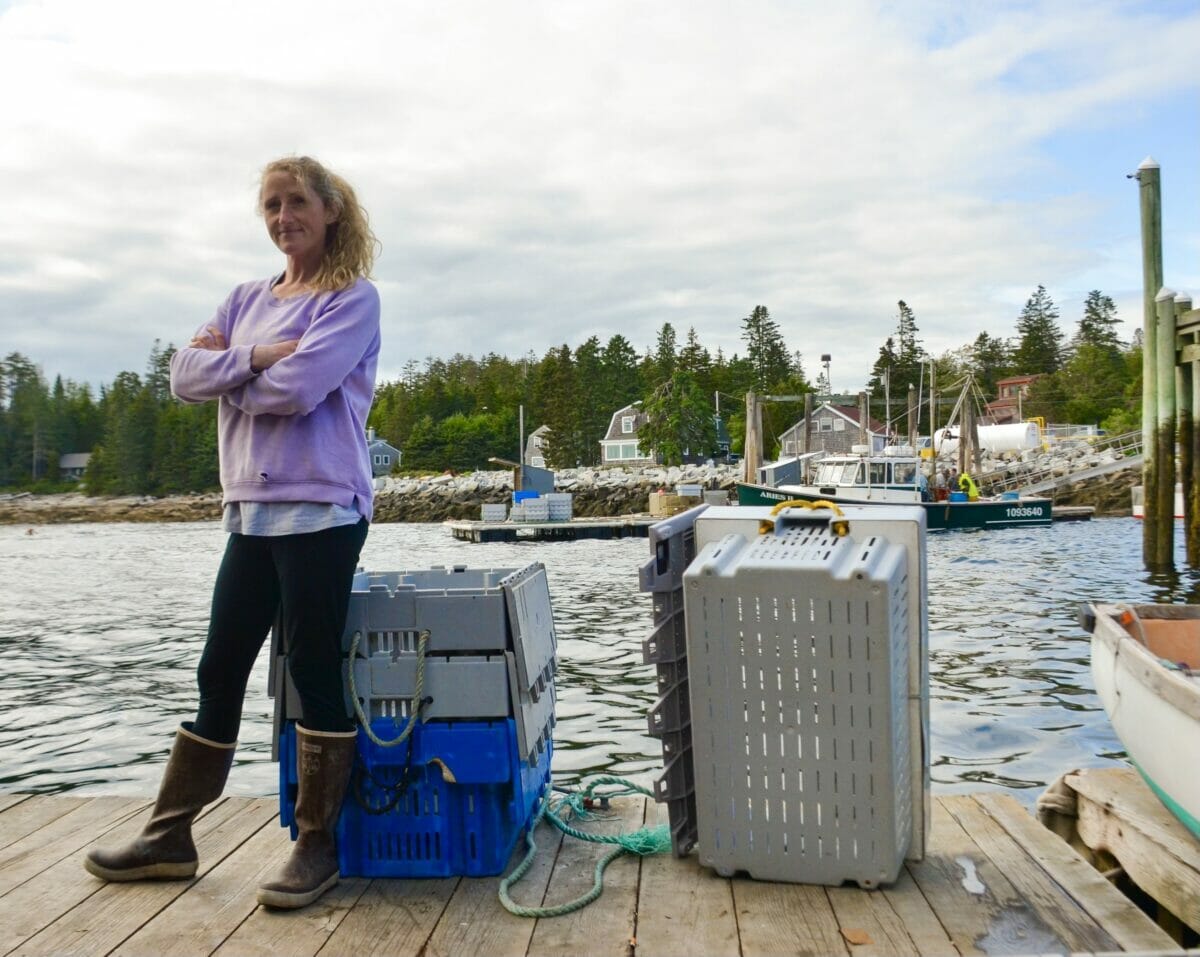
Krista Tripp, pictured in South Thomaston Harbor, began hauling lobster traps went she was eight years old.Photography by Kirsten Lie-Nielsen
To become a lobster boat captain on the rugged coast of Maine, you will need more than just a few lobster traps and a boat. To catch lobster, your days will begin in the dusky pink glow of dawn, filling bait bags with dead fish and hauling and stacking lobster traps that weigh upwards of 50 pounds. On the boat, you must always have one eye on the trap lines that threaten to entangle you and pull you overboard. There is paperwork, too: You must complete an apprenticeship, and you will have to pass the US Coast Guard’s captain’s test.
If you are a woman, the challenges don’t stop there. You may be the only woman fishing out of your harbor, vying for respect in an industry that throughout its long history has welcomed only men onboard. Every day, you’ll be working to prove you belong on the boat and not keeping the books back at the wharf.
When Krista Tripp was 18, she’d completed all of the hours at sea necessary to get her captain’s license, but her parents submitted her brother’s paperwork to the State of Maine and not hers. Why? Even though Krista had been hauling traps since she was eight years old and running her own boat since 15, the expectation was that now she’d settle down and start having babies.
“My brother and I shared the boat, we had 150 traps and I became obsessed at an early age,” Tripp recalls.
“I knew that was what I wanted to do. But, as a girl, my parents didn’t really take me seriously.”
Tripp would spend the next few years working as a sternman off of a scallop boat in Massachusetts. Eventually, she returned to Maine, and after 14 years, she got herself off the waiting list and became the captain of her own lobster boat. Today, she has been captaining her own lobster boat for more than eight years.
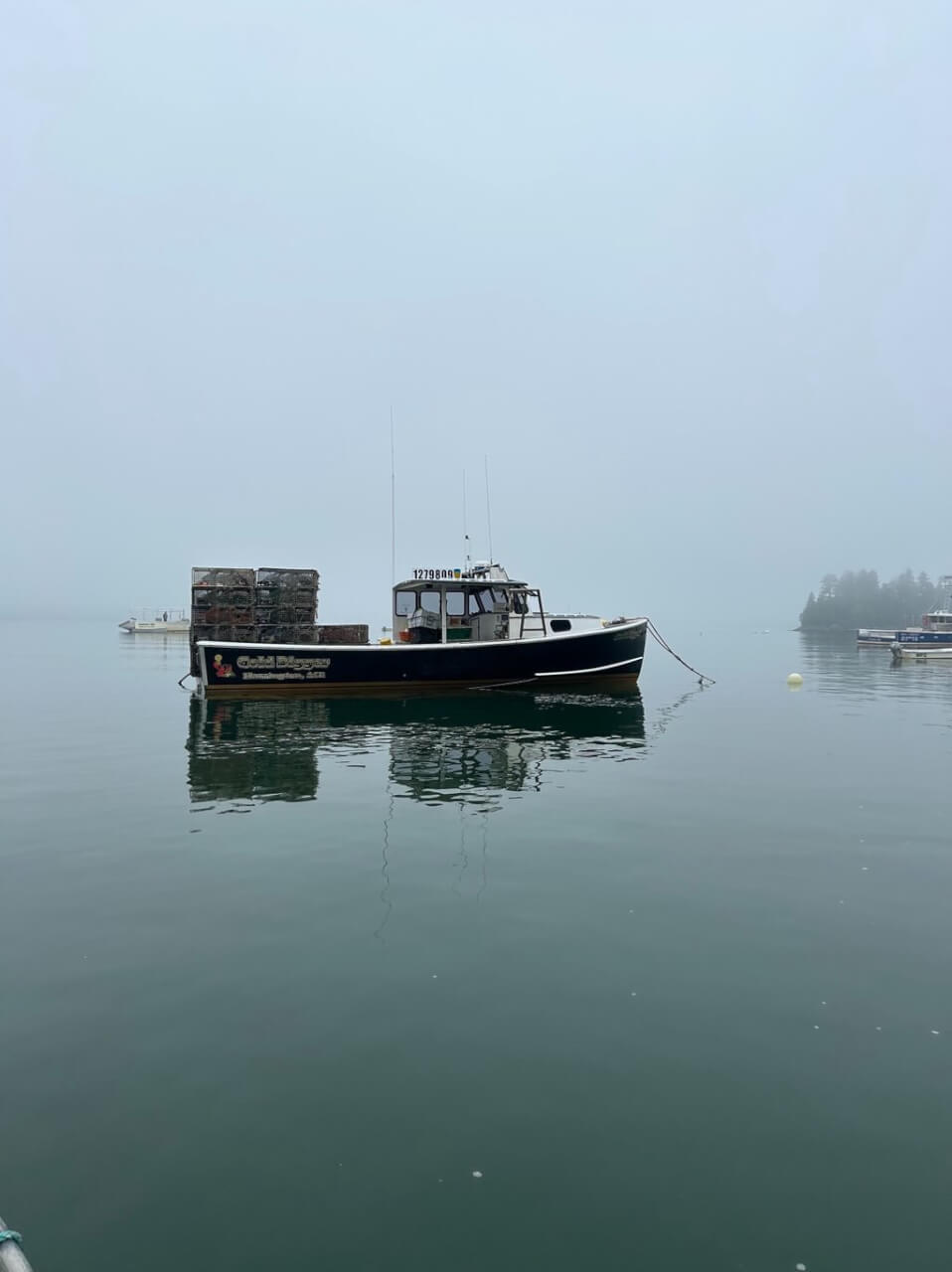
Heather Strout Thompson started lobstering at age 10. She fishes the state limit of 800 traps out of the rural harbor of Harrington, just outside of Jonesport in the deep Downeast of Maine. Growing up there, it was either the sea or the blueberry fields, and Strout wasn’t a fan of the blueberry fields.
“My dad was the one who gave me the hardest time out of anybody,” says Strout. “I always wanted to prove him wrong, throughout my childhood and even now, to prove that I can do it.”
Down the coast in the endearingly named town of Friendship, Kelly Wallace started fishing at age five. When she was old enough, she bought her own skiff and started hauling her traps by hand. Lobster traps are typically hauled onboard using a hydraulic trap hauler, but Wallace would haul 150 traps—each weighing 50 pounds—by hand all through high school.
Wallace’s family has been working on the water for six generations and operates the Wallace Lobster Wharf. But she was the first female member of her family to choose to become a lobster boat captain.
“It’s definitely hard to be a woman in the fishing industry because you aren’t ‘one of the guys’,” admits Tripp. “A lot of men are really egotistical when it comes to their jobs being physically demanding—so when they see a girl doing the same kind of job, it makes them feel less of a man. They just aren’t as welcoming.”
But none of these women has let a little bit of ego hold them back.
“I might not do things the exact way a man does things,” says Heather Strout Thompson. “But I can get the job done. I might not lift a trap with my arms—I might have to use my legs a little bit—but I can get it up there.”
Being a woman in the lobstering industry can be singular, but it is a challenge upon which all three women have thrived. And within the world of lobster fishing, the proof is in the traps hauled and the hours put in.
“I’ve noticed more men giving women opportunities,” says Thompson, “because they’re looking for a more reliable person to work with and women are very reliable. They’re going to do whatever they can to prove themselves.”
Tripp echoes the same sentiment. “Some guys think that women are great workers because they want to prove themselves more.”
“When I was younger, you never saw women on a boat, ever,” says Tripp. “I know a lot of other women lobstering now, but I never did before.”
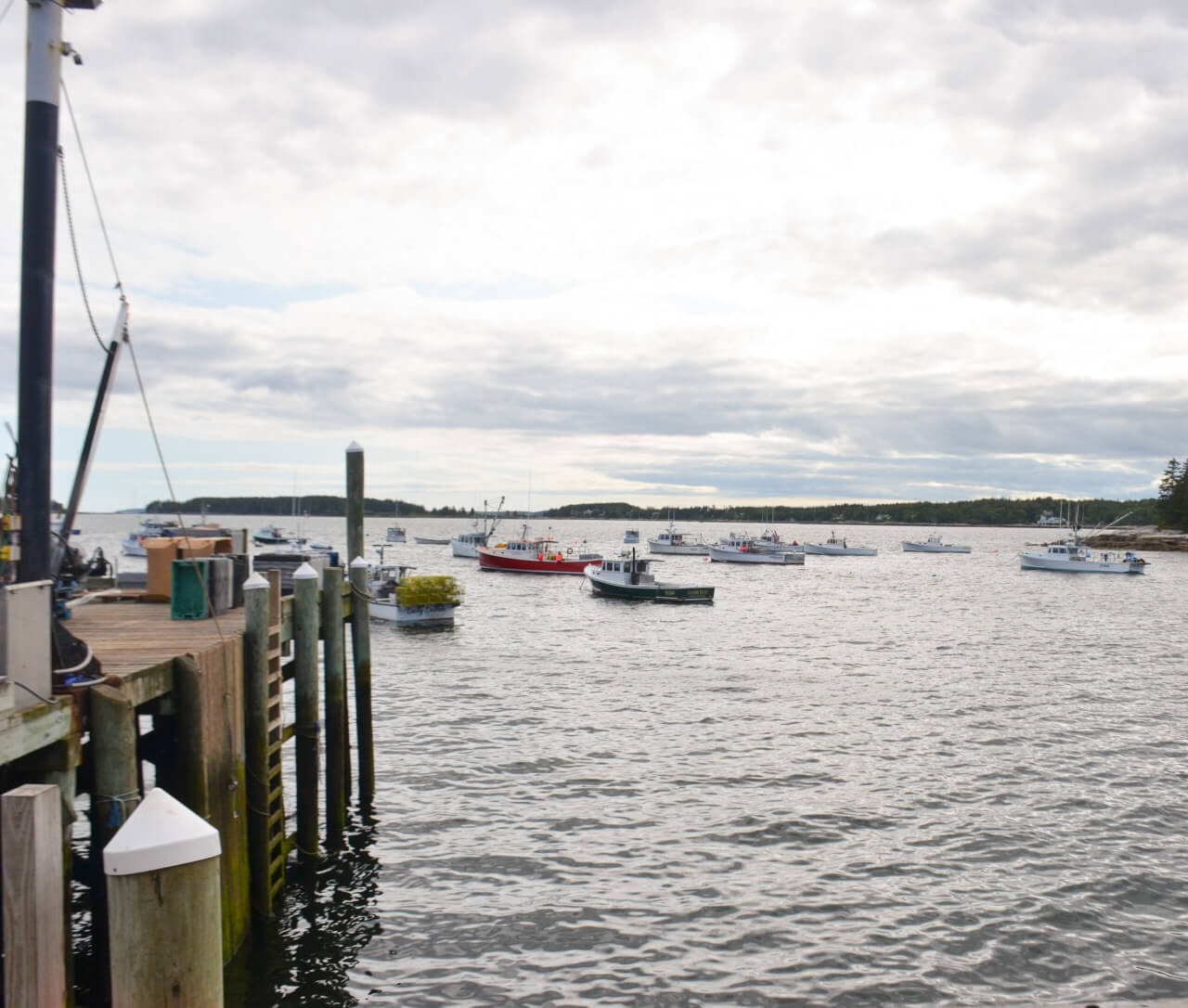
The lobster industry is a tough place to make a living for anyone. It is the backbone of Maine’s economy and the iconic food of the state, but it has become a more challenging industry in recent years.
The Gulf of Maine is warming faster than any other body of water in the world, and to survive, lobster may follow the Maine shrimp north to Canadian waters. When fishing, lobstermen are careful to take only crustaceans of a certain size and to return females with eggs to the sea. Nevertheless, additional environmental regulations come down hard on Maine lobstermen, while the cruise ships and tankers responsible for pollution and whale strikes are largely unregulated. Since 2020, the price of fuel has risen steadily, while the market price of lobster has dropped. Commercial fishing remains one of the most deadly professions in the United States, making every trip to haul a risk.
With all of these hurdles, you may wonder why women are heading out to sea in pursuit of the recognizable red “bugs.” But Maine women are as resilient as the state’s rocky coast, and they seem uniquely suited to thriving in a trade that requires grit and diligence.
read more
Women are Charting New Paths on Changing Waters
Marina Landrith is a 13-year-old aspiring lobsterwoman who fishes out of the picturesque harbor of Rockport. She currently holds a student license that allows her to fish up to 50 traps. On lobstering days, she launches her boat, fills her bait bags and motors out to haul her traps.
Her family has been lobstering for five generations and she was inspired to begin by her uncle, who lives and fishes off of Matinicus Island, the farthest inhabited land off the east coast of the US. Matinicus is home to less than 100 year-round residents, the majority of whom are lobstermen. Landrith’s uncle has been taking her out lobstering since she was a baby.
“What I enjoy most about it is that I get to spend time with my dad when we go out to haul and the feeling of accomplishment when I get in from hauling and sell what I caught,” says Landrith.
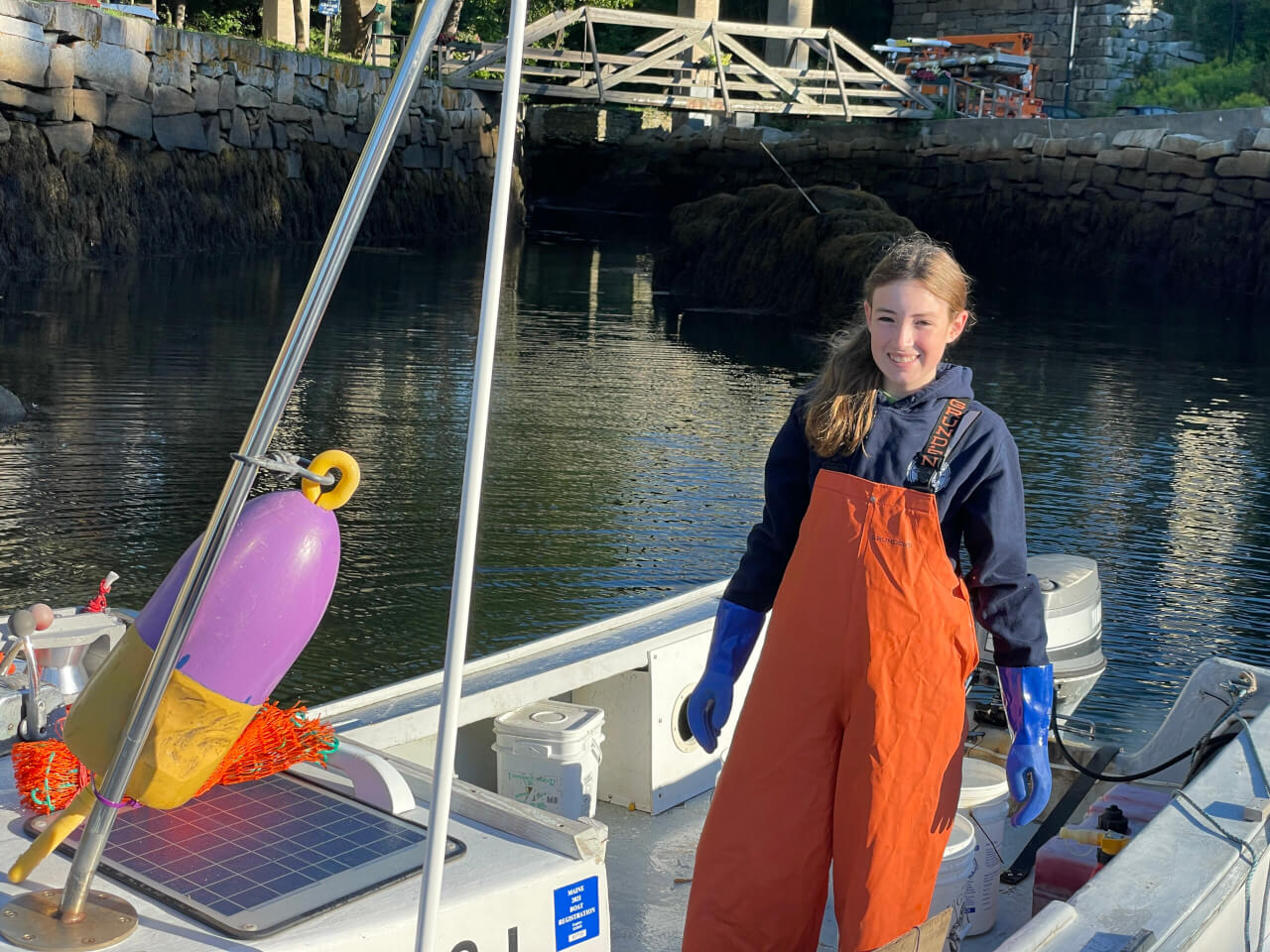
She knows several women who lobster or assist as sternmen on lobster boats, including her own 10-year-old cousin. A sense of accomplishment and personal pride seem to drive every woman in the industry.
“Nobody else cares that I’m doing this or not,” says Heather Strout Thompson.
“It’s something within yourself that you have to push and want to be able to do. At the end of the day, you’re the one that’s going to sit back and ask, ‘Did I work as hard as I could? Did I earn my spot here?’ And I feel I have.”
While commitment and drive push these women off shore every day to compete in the lobstering industry, the inspiration always circles back to family. The majority of lobstermen, male or female, are continuing a family tradition.
When Landrith thinks about her future, she can imagine life as a lobsterwoman. Someday, she wants to live on Matinicus like her uncle. “I think it would be great to live out there where my family grew up and I have visited during the summer for as long as I can remember,” she says.
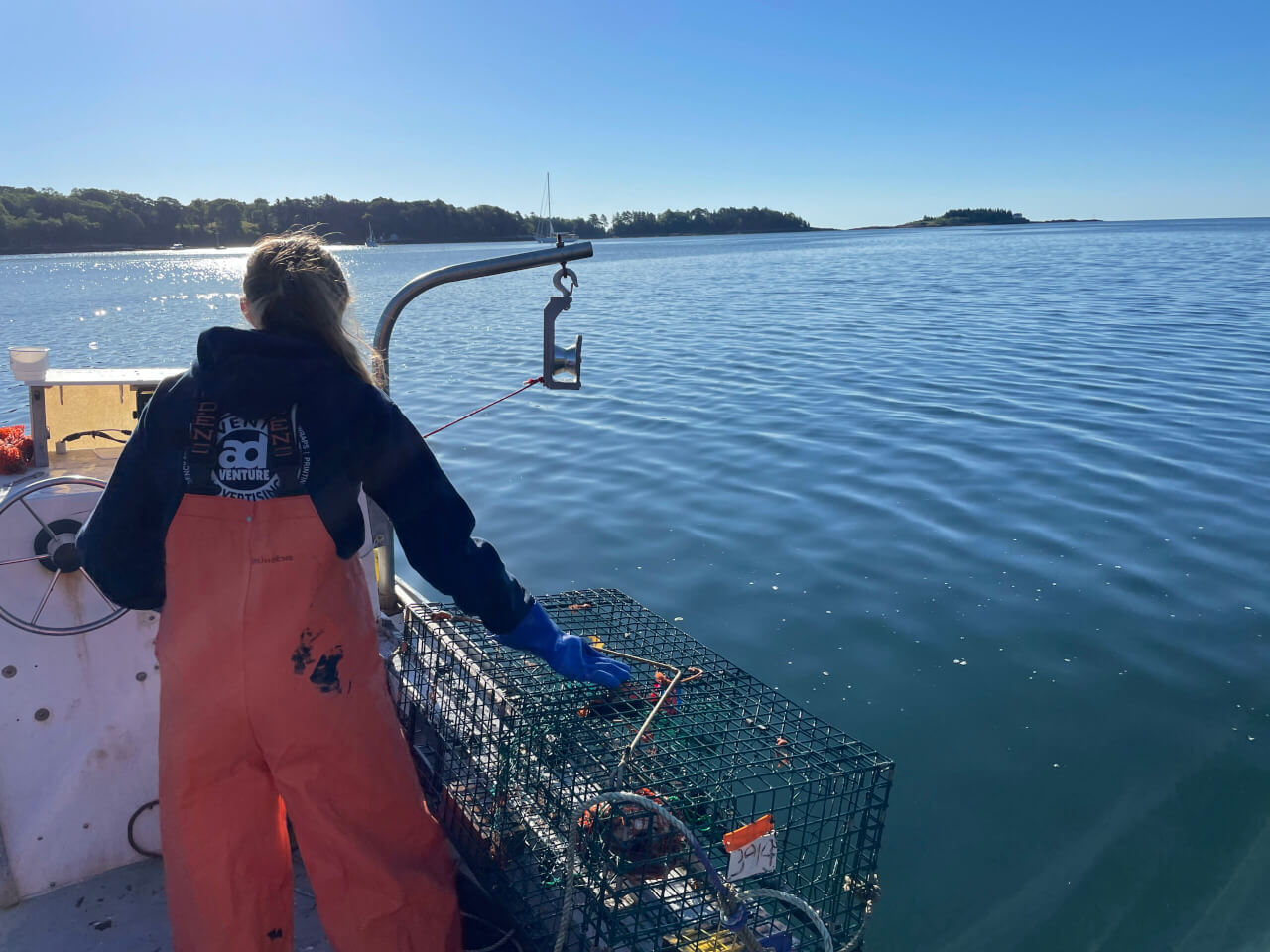
Thompson points out that in the lobstering world, family goes beyond flesh and blood. “Fishermen are some of the most generous people I’ve ever met,” she says. “They’ll stop what they’re doing and help you, tow you in, give you a part to fix your boat, so you can get back to haul. It’s a family within the lobstering industry.”
And the family of women who lobster continues to grow. In 2021, 15 percent of lobster licenses belonged to women, compared to less than 5 percent in 2014. When tomorrow’s generation of lobstermen look back at their family heritage, it won’t be a men’s club anymore.
“There’s different things that I might do that aren’t the way the men do it,” says Thompson. “But that doesn’t mean it’s wrong; it’s just different. Sometimes, you don’t have to do it the same as everybody else does. Do what’s best for you, what you are comfortable with and keep moving forward.”
read more
The Uncertain Future of Lobster Fishing in Maine
Follow us

This work is licensed under a Creative Commons Attribution-NoDerivatives 4.0 International License.
Want to republish a Modern Farmer story?
We are happy for Modern Farmer stories to be shared, and encourage you to republish our articles for your audience. When doing so, we ask that you follow these guidelines:
Please credit us and our writers
For the author byline, please use “Author Name, Modern Farmer.” At the top of our stories, if on the web, please include this text and link: “This story was originally published by Modern Farmer.”
Please make sure to include a link back to either our home page or the article URL.
At the bottom of the story, please include the following text:
“Modern Farmer is a nonprofit initiative dedicated to raising awareness and catalyzing action at the intersection of food, agriculture, and society. Read more at <link>Modern Farmer</link>.”
Use our widget
We’d like to be able to track our stories, so we ask that if you republish our content, you do so using our widget (located on the left hand side of the article). The HTML code has a built-in tracker that tells us the data and domain where the story was published, as well as view counts.
Check the image requirements
It’s your responsibility to confirm you're licensed to republish images in our articles. Some images, such as those from commercial providers, don't allow their images to be republished without permission or payment. Copyright terms are generally listed in the image caption and attribution. You are welcome to omit our images or substitute with your own. Charts and interactive graphics follow the same rules.
Don’t change too much. Or, ask us first.
Articles must be republished in their entirety. It’s okay to change references to time (“today” to “yesterday”) or location (“Iowa City, IA” to “here”). But please keep everything else the same.
If you feel strongly that a more material edit needs to be made, get in touch with us at [email protected]. We’re happy to discuss it with the original author, but we must have prior approval for changes before publication.
Special cases
Extracts. You may run the first few lines or paragraphs of the article and then say: “Read the full article at Modern Farmer” with a link back to the original article.
Quotes. You may quote authors provided you include a link back to the article URL.
Translations. These require writer approval. To inquire about translation of a Modern Farmer article, contact us at [email protected]
Signed consent / copyright release forms. These are not required, provided you are following these guidelines.
Print. Articles can be republished in print under these same rules, with the exception that you do not need to include the links.
Tag us
When sharing the story on social media, please tag us using the following: - Twitter (@ModFarm) - Facebook (@ModernFarmerMedia) - Instagram (@modfarm)
Use our content respectfully
Modern Farmer is a nonprofit and as such we share our content for free and in good faith in order to reach new audiences. Respectfully,
No selling ads against our stories. It’s okay to put our stories on pages with ads.
Don’t republish our material wholesale, or automatically; you need to select stories to be republished individually.
You have no rights to sell, license, syndicate, or otherwise represent yourself as the authorized owner of our material to any third parties. This means that you cannot actively publish or submit our work for syndication to third party platforms or apps like Apple News or Google News. We understand that publishers cannot fully control when certain third parties automatically summarize or crawl content from publishers’ own sites.
Keep in touch
We want to hear from you if you love Modern Farmer content, have a collaboration idea, or anything else to share. As a nonprofit outlet, we work in service of our community and are always open to comments, feedback, and ideas. Contact us at [email protected].by Kirsten Lie-Nielsen, Modern Farmer
July 26, 2023
Modern Farmer Weekly
Solutions Hub
Innovations, ideas and inspiration. Actionable solutions for a resilient food system.
ExploreExplore other topics
Share With Us
We want to hear from Modern Farmer readers who have thoughtful commentary, actionable solutions, or helpful ideas to share.
SubmitNecessary cookies are absolutely essential for the website to function properly. This category only includes cookies that ensures basic functionalities and security features of the website. These cookies do not store any personal information.
Any cookies that may not be particularly necessary for the website to function and are used specifically to collect user personal data via analytics, ads, other embedded contents are termed as non-necessary cookies.
STRONG, RESILIENT, INTELLIGENT MAINE WOMEN! Makes my 70 y.o. heart soar with pride!
Great story” Go ladies! In my own business I found the women were the best and most organized of all our employees.
Such a poised and meaningful article about brave women who love what they do. Thanks for getting this awesome story out. These women deserve a ton of credit.
I’m proud of these woman but not because they are woman who fish but because they are commercial fishermen. My own experience starting in the 70s to the present with woman fishermen is the overwhelming majority of fishermen and the community they fish out of are very supportive and proud of these woman because they are an example for all but particularly young girls who an become anything they put the effort into becoming. Linda Greenlaw is certainly the most famous female fishermen and has never seen herself as a fisherwoman, as she has said, the DON’T call female firemen… Read more »
Cool, my sister is law lobsters in the 80s
Great story! But how did they mention Rockport and miss the 102 year old woman who still lobsters there and has most of her life?
My best to these ladies.
So 8-13 years old kids can do it, women can’t be too far behind. You know lobstering is tough, all those nice summer days on the water must get to you!